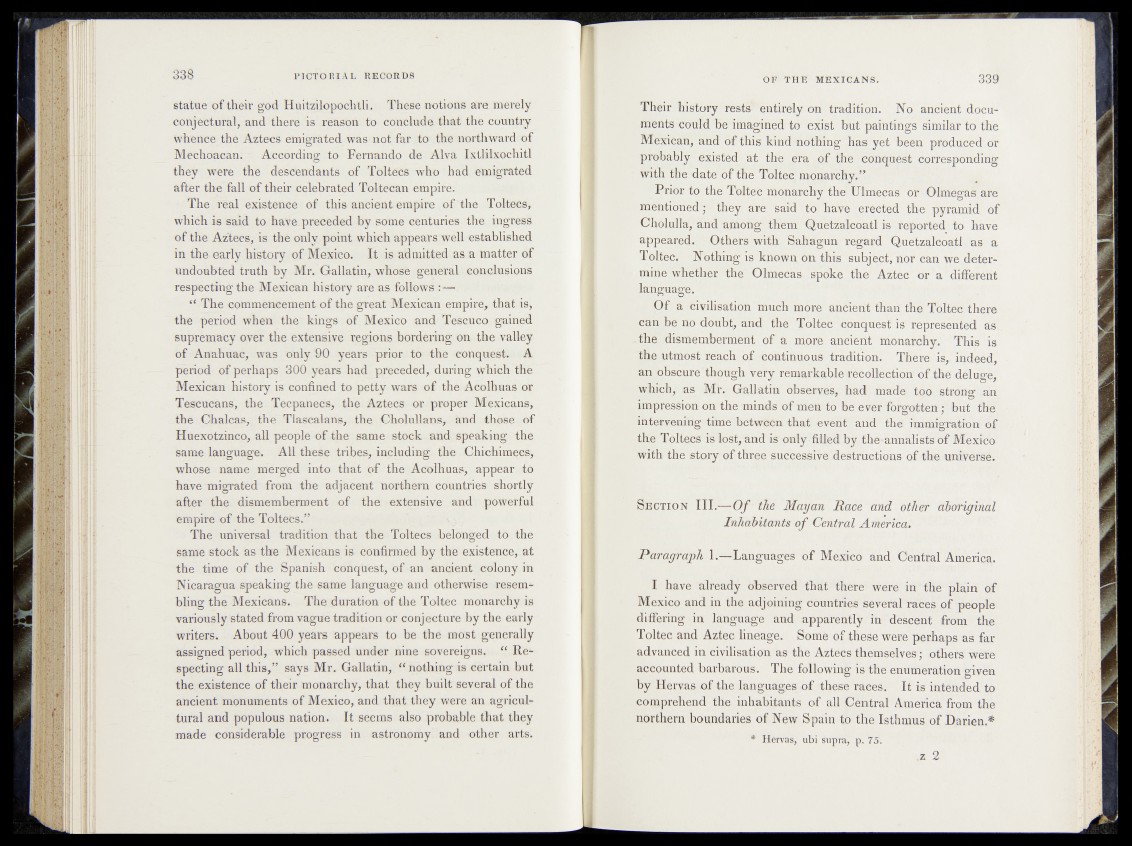
statue of their god II uitzilopoctitli. These notions are merely
conjectural, and there is reason to conclude that the country
whence the Aztecs emigrated was not far to the north wal'd of
Mechoaean. According, to Fernando de Alva Ixtlilxochiti
they were the descendants of Toltees who had emigrated
after the fall of their celebrated Toltecan empire.
The real existence of this ancient empire of The Toltees,
which is said to have, preceded by some centuries the ingress
of the Aztecs, is the only point which appears well established
in the early history of Mexico. It is admitted as a matter of
Undoubted truth by Mr. Gallatin, whose gênerai conclusions
respecting the Mexican history are as follows :■*—,
“ The commencement of the great Mexican empire, that is,
the period when the kings of Mexico and TeseUco. gained
supremacy over the extensive regions bordering on the valley
of Anahuac, was only 90 years 'prior to the ‘conquest. A
period of perhaps' -300 years had preceded, during which the
Mexican history is confined to petty wars of the Aeolhuas or
Tescucans, the Tecpanecs, the Aztecs or proper Mexicans*
the Chalcas, the Tlascalans, the Cholullans, and those.of
Huexotzinco, all people of the same stock and speaking the
same language. All these tribes, including the Chicbimecs,
whose name merged into that of the Acolhuas, appear to
have migrated from the adjacent northern countries shortly
after the dismemberment of the extensive and powerful
empire of the TolteCs.”
The universal tradition that the Toltees belonged to the
same stock as the Mexicans is confirmed by the existence, at
the time of the Spanish conquest, of an ancient colony in
Nicaragua speaking the same language and otherwise resem*
bling the Mexicans. The duration o f the Toltec monarchy is
variously stated from vague tradition or conj ecture by the early
writers. About 400 years appears to be the moist generally
assigned period, which passed under nine sovereigns. “ Respecting
all this,” says Mr. Gallatin, “ nothing is certain but
the existence of their monarchy, that they built several of the
ancient monuments of Mexico, and that they were an agricultural
and populous nation. It seems also probable that they
made considerable progress in astronomy and other arts.
Their history rest!*1 entirely on tradition5.' No ancient doeu-
ni|htW<eonld be imagined'to* exfet but'paintings similar to the
Mexican,'and of this ra id nothing 'has y|§fibeén produced or
probably existed at pf the conquest corresponding
with fhe'tialeof the Töltèa! mönlarchy/’
’ Brior to the Tóltec monarchy' the^Glmedas or Olmegas are
^ ‘ê’htiOTh'd^ the^laTe asaid to tiavp -prec^d^the. pyramid of
Gholulla, and amoti^ them Quetza’fcoa.-tl ‘i$ reported to havé
appeared. Others with Sah^guhVre^a^ '^netzalcoatl as a
Toltepv- Nothing is known'on this subjcctfriör raa’we determine
whether ''the Olmecas SpoUp the Aztec' or a ’differént
language.
Of a Civilisation much more gpéient than the Toltee there
can-tie no doubt, and the Toltec *conqUeWS^ppre'léhiëd. as
the dismemberment o*Ta more anëife'nt' ’monarchy. This is
thp utmost reach .of continuous tradition. There-is, indeed,
an obscure though- very remarkable ^eedllec&bjtf öf the dèluge,-
which, as Mr. Gallatin observes, had made too strong, ran
impression-on the minds of mefi sto he'ëvfeï:fèigotten; but the
intervening time between that event -and thé " immigration of
the Toltees is lost, and is only filled by the*annalists of Mexi-Öö
with the story of three successive destructions of the universe.
Section I I I .±— rOf- the Mayan Race and* other aboriginal
Inhabitants o f Central America.
Paragraph 1.—Languages of Mexico and Central America.
I have already observed that there were in'the plain of
Mexico and in the adjoining countries several races of people
differing in language and apparently in descent from the
Toltec and Aztec lineage. Some of these Were perhaps as for
advanced in civilisation as the Aztecs themselves; .others were
accounted barbarous. The following is the enumeration given
by Hervas of the languages of these races. It is intended to
comprehend the inhabitants of all Central America from the
northern boundaries of New Spain to the Isthmus of Darien.*
* Hervas, ubi £uprai P* 75-
z 2